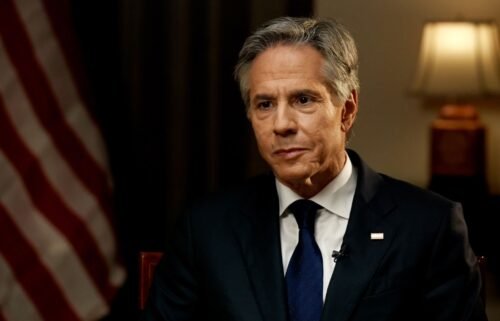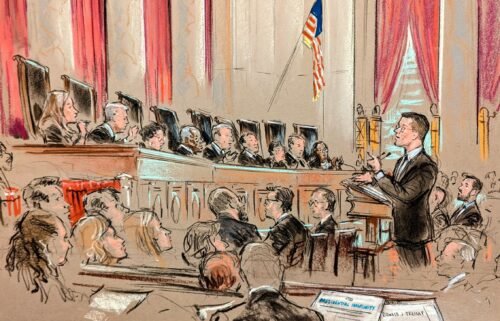Fears of extremist violence go ‘well beyond’ January 6 anniversary

By Geneva Sands, CNN
A year after the attack on the US Capitol, homeland security and law enforcement officials nationwide are bracing for potential “unprecedented” levels of violence this year as midterm elections kick into gear and the pandemic continues to affect everyday life.
The country remains polarized, and many people are angry and frustrated about their individual selves or society’s conditions after two years of Covid-19 upheaval, turbulent economic conditions and government restrictions, sources and non-governmental researchers told CNN.
Late last month in a string of unrelated incidents, a gunman killed five people in the Denver area, a man was stopped on his way to Washington, DC with weapons and a “hit list,” and a New Year’s Eve fire at Planned Parenthood facility in Tennessee was declared arson. All these incidents come as officials are already preparing for protests in the nation’s capital later this month.
Societal divisions coupled with online and media content that is saturated with conspiracy theories and disinformation has led officials to worry that the levels of violence in 2022 could be “unprecedented,” a federal law enforcement official said.
While much attention focused on the January 6 anniversary, “from a law enforcement perspective, it goes well beyond that,” the official said. Another concern is that the volatility will only increase as the election cycle progresses and we get closer to the 2022 midterm elections, they added.
Fractures in US society and the spread of misinformation are likely to be exacerbated during the election cycle, the official said, pointing out that public figures, such as those running for office, those who hold elected office and those in the media who comment about these issues will only increase their activities.
“It’s not a pleasant forecast,” said Peter Simi, an associate professor at Chapman University who studies extremist groups and violence. “I think we see the threats mounting. And really transitioning into what we might call ‘an everyday insurgency.'”
One year after the January 6 Capitol riot, far-right extremists still contend the 2020 election was stolen, according to recent report from SITE Intelligence Group, a non-governmental organization that tracks online extremist activity.
However, these extremist groups have dispersed their focus on various issues, like vaccines, Covid-19 conspiracy theories and Biden administration policies, the report found.
“To be clear, however, the extremist momentum behind January 6 has not diminished — it has spread in all directions,” SITE director Rita Katz said.
That energy has been redirected toward Covid-19 mitigation measures, the migrant crisis at the Southern border, critical race theory and elections, she added.
She also pointed to the upcoming Congressional elections, “which will be centered on the same hot-button topics these violent extremist actors have pivoted towards.”
Conspiratorial election and voting fraud theories are a major concern
Ideologies of hate, false information, false narratives are primary sources of the threat landscape in the US today, Homeland Security Secretary Alejandro Mayorkas told CNN Wednesday.
“The divisiveness in our country is really fueling it as well,” he said. “Words matter. And the words of leaders matter a lot. And that can actually fuel the spread of false information and can drive people to violence.”
Conspiracy theories about election fraud, which probably contributed to the breach of the US Capitol last year, continue to resonate among domestic violent extremists, according to a recent DHS intelligence assessment obtained by CNN.
Mayorkas told reporters this week that the department is “very, very focused on the security and integrity of our election processes,” when asked if he was worried about threats connected to the upcoming midterm election cycle.
Over the past year, there has been a dramatic uptick of threats made against lawmakers, with 9,600 in 2021 alone, US Capitol Police Chief Tom Manger said this week. A senior Capitol security official previously attributed that increase in part to “a more bitter and partisan political environment and citizens for whom the issues that they’re angry about are core value and identity issues.”
As always, the problem remains sifting through the noise of angry tweeters versus actual threats, the security official said, adding that the “majority” of threats don’t “represent a risk of real violence.”
DHS intelligence chief John Cohen told KNX News radio on Wednesday, “What keeps me up at night, and I know is keeping up a number of my colleagues around the country, is not just the anniversary of January 6, but the threat environment as we enter 2022.”
Cohen pointed to the polarization of US society, as well as efforts from foreign intelligence services, terrorist organizations and domestic extremist thought leaders who seek to exacerbate social tensions, undermine credibility in the US government and inspire violence by planting and spreading online and media content.
There continues to be a “steady tempo of mass casualty attacks by angry, disaffected people who are inspired by the content that they’re consuming online,” he said during the interview.
Mass casualty incidents, for example, in Denver, Atlanta, Indianapolis over the past year all displayed signs of the volatile threats concerning law enforcement today, with some suspects coming to the attention of law enforcement before they carried out attacks.
Last month, a California man was stopped by the Cass County Sheriff’s department in Iowa with a “hit list” of people he intended to kill, including Anthony Fauci and Mark Zuckerberg, according to a federal criminal complaint. He had the address of the White House in his GPS and told investigators he would kill President Joe Biden, the complaint said. The suspect’s attorney told the court he intends to rely upon an insanity defense.
What’s law enforcement doing about it?
Mayorkas said that DHS has increased and improved information sharing with local communities over the past year to help counter the threat from domestic terrorism, as well as added local grant funding and established a new, dedicated domestic terrorism branch.
Many in law enforcement have been working to ramp up information sharing over the past year. For example, law enforcement officials nationwide were recently able to see there were around 200 threats to schools across the country that had proliferated on TikTok, a law enforcement source said.
“Previously, we had no capability to see all those threats at the same time, where they were and what type of threats there were,” the source said, pointing to the failures leading up the January 6, 2021.
That said, there is still on the federal government side, a “large disconnect between the many portals that the government manages,” the source said.
DHS, FBI and local authorities all manage different systems that are difficult to coordinate, the source added.
Last month, Cohen raised concerns about the ability for law enforcement to manage threats across the US.
“We do not yet have, across the United States, a consistent level of capability that is designed to enable threat assessment and threat management activities at the local level,” Cohen said during a George Washington University forum.
Mayorkas agreed last week, saying, “We are in fact, seeing an uneven level of capabilities in local communities.”
Neither official mentioned specific communities, but the secretary said the unevenness underscores the importance of information sharing and intelligence sharing among law enforcement and homeland security officials.
The suspect in the recent metro Denver shooting spree, for instance, was investigated by Denver police in 2020 and early 2021 but charges were never filed. The gunman — identified as Lyndon James McLeod, 47, foreshadowed the rampage in a series of books he wrote under a pseudonym, and he used the names of actual victims in his writings, CNN reported.
“This individual was on the radar of law enforcement,” Denver Police Chief Paul Pazen previously said without elaborating.
Five people were killed in the shootings and several were wounded, including a policewoman.
Without providing specifics, Mayorkas said that in the last several weeks, DHS has seen the benefits of information sharing, in a situation “where a particular community was not necessarily as developed in its apparatus, or evolved as others, but nevertheless, through the information we imparted to it, it was able to identify a potential threat before that threat materialized and inform us.”
‘Asleep at the wheel’
A year after the January 6 Capitol riot, the extremism landscape is “all over the map,” Seamus Hughes, deputy director of the Program on Extremism at George Washington University, told CNN.
There are traditional White supremacists, anti-government groups and accelerationists, as well as a “significant group of folks” that are interested in ISIS and Al Qaeda, he said. The objective of accelerationism is to foment divisiveness and polarization that will induce the collapse of the existing order and spark a civil war, according to the Council on Foreign Relations, which recently wrote about the perils of the movement.
The lack of large-scale events similar to the January 6 riot over the past year, is a reflection of a fracturing movement combined with the efforts of law enforcement, according to Hughes.
Looking ahead to the election season, Hughes pointed out that while there has been a rise in threats against election officials and public officials, several elections have safely taken place since last January.
When it comes to far-right extremism, Simi, the Chapman University professor, told CNN, “We’ve been asleep at the wheel for a long time,” in part making it difficult for the public to understand the multiple threats facing the US.
“Part of that is because it’s an insider threat. It’s easier to point to something from the outside, those that are attacking us from outside,” he said, referencing the terrorism of 9/11.
The-CNN-Wire
™ & © 2022 Cable News Network, Inc., a WarnerMedia Company. All rights reserved.



